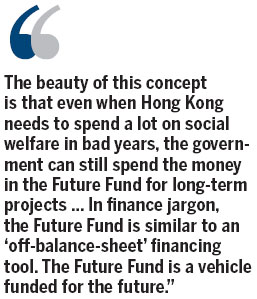Should we 'fund the future' or be 'funded for the future'?
Updated: 2014-03-06 07:33
By Raymond So(HK Edition)
|
|||||||||
In last week's budget speech, the financial secretary mentioned the idea of the "Future Fund", so as to set aside financial resources to meet challenges in the future. The concept of the Future Fund is not new, and there were advocates of such a fund in the past. Nevertheless, the need for a Future Fund is still subject to debate. When the John Tsang made reference to the projected structural deficit in his budget speech, he also mentioned the possibility of setting up a Future Fund. The key question is: Is the Future Fund necessary?
When we look at Future Funds elsewhere, most of them are set up because of large forecasted future liabilities, in particular liabilities to civil servants' pension. In other words, Future Funds are set up to meet foreseeable future obligations. When we talk about this concept of saving up to meet future obligations, this is a reasonable and logical way to do things. It is similar to parents setting up education funds for children's college money. Of course, an education fund is very specific in the use of money, and there will not be much disagreement. The definition of a Future Fund, however, leaves a lot of room for discussion. For example, which areas can the financial resources in the Future Fund be deployed into, or, when can the Future Fund be liquidated to meet future challenges. From the initial responses from the financial secretary, the Future Fund is supposed to be an earmarked fund for a specific purpose. Nevertheless, the Future Fund is still a concept without any substance. In other words, the argument rests on the details.

Those who oppose the idea of a Future Fund would say that putting money into an investment portfolio will not give the largest yield to meet future challenges. Since the Future Fund is from public money, investment styles and guidelines will tend to be conservative. Very likely investment returns on the Future Fund can only match inflation, or at best, keep ahead of inflation. It will be much better if the money can be invested in more productive areas such as public infrastructure or education so society can benefit from higher productivity. If Hong Kong has higher productivity, the economic values generated will be higher and hence future income. From this point of view, we should not set up a Future Fund. The money in the Future Fund can be invested now to generate future benefits. In simple words, we should fund the future.
Nevertheless, from a public finance point of view, the above idea is not without problems. The Basic Law states clearly how public expenditure is to be conducted. According to Article 107 of the Basic Law, "the Hong Kong Special Administrative Region shall follow the principle of keeping expenditure within the limits of revenues in drawing up its budget, and strive to achieve a fiscal balance, avoid deficits and keep the budget commensurate with the growth rate of its gross domestic product." If we look at the wording, it is clear that growth in public expenditure should be consistent with the growth rate of Hong Kong's GDP. If we invest in the future, we may over-spend and hence breach the Basic Law.

In the accounts of public expenditure in Hong Kong, there is no discrimination between investment and consumption. All of them will be classified as expenditure, as long as it is a cash outflow. But this leads to a dilemma. If we face valuable but expensive public infrastructure that is worth investing in, we may easily "over-spend" in terms of public expenditure accounting. The idea of a Future Fund is to set aside funds so public infrastructure projects can be financed by separate accounts. In this way, the public expenditure figures will not be distorted. The beauty of this concept is that even when Hong Kong needs to spend a lot on social welfare in bad years, the government can still spend the money in the Future Fund for long-term projects. Hence, the government will not face the problem of making the growth in public spending higher than the growth in GDP. In finance jargon, the Future Fund is similar to an "off-balance-sheet" financing tool. The Future Fund is a vehicle funded for the future.
The question is whether we should fund the future or be funded for the future. Both ideas are not wrong. Indeed, ideas from these two schools of thought are actually not mutually exclusive, if we did not have constraints from the Basic Law. Of course, people may try to bypass this constraint by different interpretations of the Article 107. Indeed, we had several years of deficits, which technically are a breach of Article 107. The recent debate on the Future Fund, to me, is a good indication that we need new thinking about Hong Kong's public finances.
The author is dean of the School of Business at Hang Seng Management College.
(HK Edition 03/06/2014 page1)